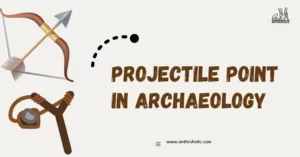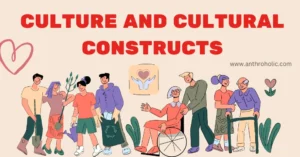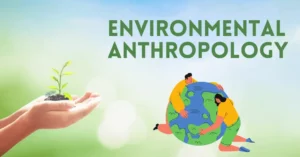AI Answer Evaluation Platform Live Now. Try Free Answer Evaluation Now
UPSC Anthropology Optional Syllabus for IAS Mains
Anthropology is one of the most popular optional subjects in the UPSC Civil Services Exam. Every topic on this page is linked to a well researched and detailed article about it, you can click and prepare entire syllabus content from here. The UPSC Anthropology Optional Syllabus for IAS Mains Exam is as follows:

Suggested:
Anthropology Optional Previous Year Questions Papers from 2009 to Present Year in PDF. Download Now
Anthropology Paper 1 Syllabus

Anthropology Paper 2 Syllabus
| S. No. | Topic |
|---|---|
| 1.1 | Evolution of the Indian Culture and Civilization—Prehistoric (Palaeolithic, Mesolithic, Neolithic and Neolithic-Chalcolithic), Protohistoric (Indus Civilization). Pre-Harappan, Harappan and postHarappan cultures. Contributions of the tribal cultures to Indian civilization. |
| 1.2 | Palaeo—Anthropological evidences from India with special reference to Siwaliks and Narmada basin (Ramapithecus, Sivapithecus and Narmada Man). |
| 1.3 | Ethno-archaeology in India: The concept of ethno-archaeology; Survivals and Parallels among the hunting, foraging, fishing, pastoral and peasant communities including arts and crafts producing communities. |
| 2 | Demographic profile of India—Ethnic and linguistic elements in the Indian population and their distribution. Indian population—factors influencing its structure and growth. |
| 3.1 | The structure and nature of traditional Indian social system—Varnashram, Purushartha, Karma, Rina and Rebirth. |
| 3.2 | Caste system in India— Structure and characteristics Varna and caste, Theories of origin of caste system, Dominant caste, Caste mobility, Future of caste system, Jajmani system. Tribe-case continuum |
| 3.3 | Sacred Complex and Nature-Man-Spirit Complex. |
| 3.4 | Impact of Buddhism, Jainism, Islam and Christianity of Indian society. |
| 4 | Emergence, growth and development in India—Contributions of the 18th, 19th and early 20th Century scholar-administrators. Contributions of Indian anthropologists to tribal and caste studies |
| 5.1 | Indian Village—Significane of village study in India; Indian village as a social system; Traditional and changing patterns of settlement and inter-caste relations; Agrarian relations in Indian villages; Impact of globalization on Indian villages. |
| 5.2 | Linguistic and religious minorities and their social, political and economic status |
| 5.3 | Indigenous and exogenous processes of socio-cultural change in Indian society: Sanskritization, Westernization, Modernization; Inter-play of little and great traditions; Panchayati Raj and social change; Media and Social change. |
| 6.1 | Tribal situation in India—Bio-genetic variability, linguistic and socio-economic characteristics of the tribal populations and their distribution. |
| 6.2 | Problems of the tribal Communities—Land alienation, poverty, indebtedness, low literacy, poor educational facilities, unemployment, under- employment, health and nutrition. |
| 6.3 | Developmental projects and their impact on tribal displacement and problems of rehabilitation. Development of forest policy and tribals. Impact of urbanisation and industrialization on tribal populations. |
| 7.1 | Problems of exploitation and deprivation of Scheduled Castes, Scheduled Tribes and Other Backward Classes. Constitutional safeguards for Scheduled Tribes and Scheduled Castes. |
| 7.2 | Social change and contemporary tribal societies : Impact of modern democratic institutions, development programmes and welfare measures on tribals and weaker sections. |
| 7.3 | The concept of ethnicity; Ethnic conflicts and political developments; Unrest among tribal communities; Regionalism and demand for autonomy; Pseudo-tribalism. Social change among the tribes during colonial and post-Independent India. |
| 8.1 | Impact of Hinduism, Buddhism, Christianity, Islam and other religions on tribal societies. |
| 8.2 | Tribe and nation state—a comparative study of tribal communities in India and other countries. |
| 9.1 | History of administration of tribal areas, tribal policies, plans, programmes of tribal development and their implementation. The concept of PTGs (Primitive Tribal Groups), their distribution, special programmes for their development. Role of N.G.O.s in tribal development. |
| 9.2 | Role of anthropology in tribal and rural development. |
| 9.3 | Contributions of anthropology to the understanding of regionalism, communalism and ethnic and political movements. |
UPSC Anthropology Optional Syllabus PDF Download
Aspirants preparing for the UPSC Anthropology Optional should always keep a copy of the syllabus within reach. A clear understanding of the syllabus helps in strategic preparation, ensuring that no important topics are missed.
The PDF provided below contains the detailed Anthropology syllabus, including all major topics and subtopics. This will help you structure your preparation, align your study materials, and systematically cover each area. Whether you’re focusing on socio-cultural anthropology, biological anthropology, or archaeological anthropology, this syllabus acts as a roadmap to streamline your learning.
Download the PDF now and use it as a reference to track your progress and optimize your answer-writing practice.
Download: UPSC Anthropology Optional Syllabus PDF Download
Official Anthropology Syllabus Screenshots






Anthropology Optional PYQ Papers
The UPSC Anthropology Optional consists of two papers, each worth 250 marks, totaling 500 marks. Both papers are three hours long. Paper I focuses on general anthropological concepts and theories, while Paper II applies these principles to the Indian context. Each paper is divided into two sections, with four questions in each section. In both papers, the first question of Section 1 and the fifth question of Section 2 are compulsory. Candidates must choose and answer three additional questions from the remaining six, selecting those they can answer most effectively.
Anthropology PYQ Paper 1
- Anthropology Optional Paper I 2024
- Anthropology Optional Paper I 2023
- Anthropology Optional Paper I 2022
- Anthropology Optional Paper I 2021
- Anthropology Optional Paper I 2020
- Anthropology Optional Paper I 2019
- Anthropology Optional Paper I 2018
- Anthropology Optional Paper I 2017
- Anthropology Optional Paper I 2016
- Anthropology Optional Paper I 2015
- Anthropology Optional Paper I 2014
- Anthropology Optional Paper I 2013
- Anthropology Optional Paper I 2012
- Anthropology Optional Paper I 2011
- Anthropology Optional Paper I 2010
- Anthropology Optional Paper I 2009
Anthropology PYQ Paper 2
- Anthropology Optional Paper II 2024
- Anthropology Optional Paper II 2023
- Anthropology Optional Paper II 2022
- Anthropology Optional Paper II 2021
- Anthropology Optional Paper II 2020
- Anthropology Optional Paper II 2019
- Anthropology Optional Paper II 2018
- Anthropology Optional Paper II 2017
- Anthropology Optional Paper II 2016
- Anthropology Optional Paper II 2015
- Anthropology Optional Paper II 2014
- Anthropology Optional Paper II 2013
- Anthropology Optional Paper II 2012
- Anthropology Optional Paper II 2011
- Anthropology Optional Paper II 2010
- Anthropology Optional Paper II 2009
How to Prepare for UPSC Anthropology Optional?
Anthropology is one of the most scoring optional subjects in the UPSC Mains, provided candidates develop conceptual clarity and integrate case studies, diagrams, and examples in their answers. A structured and disciplined approach to covering the syllabus is essential to mastering this subject. Below are some key strategies to help you prepare effectively:
- Master the Syllabus and PYQs: Start by thoroughly analyzing the Anthropology syllabus and previous years’ question papers. This will help you understand the recurring themes and prioritize topics accordingly. Identifying high-weightage areas can streamline your study plan.
- Strengthen Your Fundamentals: A solid foundation is crucial in Anthropology. Begin with core topics such as human evolution, genetics, social structures, and tribal studies. Reading NCERTs (Biology & Sociology) will provide a basic understanding before diving into advanced materials.
- Choose the Right Books and Resources: Standard textbooks like Ember & Ember for Social Anthropology, P Nath for Physical Anthropology, and Nadeem Hasnain for Indian Anthropology are highly recommended. Supplement your reading with journals like The Indian Anthropologist and government reports on tribal affairs for contemporary updates.
- Integrate Diagrams and Flowcharts: Anthropology answers become more effective with visual representation. Regularly practice drawing human evolution sequences, kinship diagrams, and cultural adaptation models to make your answers more impactful.
- Use Case Studies and Real-Life Examples: Illustrate theoretical concepts with real-world examples. Incorporate case studies from tribal reports, census data, and government schemes to enrich your answers. Keeping track of articles from The Hindu, EPW, and Yojana will help in this aspect.
- Answer Writing and Revision: Practice is key. Attempt past 10–15 years of UPSC Anthropology questions, and focus on structuring answers with an introduction, body, and conclusion. Use a comparative approach while addressing socio-cultural aspects and always link theories to practical applications. Refer to this detailed article about Answer Writing for Anthropology Optional.
By following these strategies with dedication and regular revision, you can develop a strong command over Anthropology and maximize your score in the UPSC Mains.
Anthropology Optional Success Rate
Anthropology has consistently been a popular optional subject in the UPSC Civil Services Examination, often yielding a commendable success rate. Below is a detailed year-wise table showcasing the number of candidates who appeared for Anthropology as their optional subject, the number recommended, and the corresponding success rates from 2011 to 2020.
| Year | Candidates Appeared | Candidates Recommended | Success Rate (%) |
| 2011 | 463 | 61 | 13.2 |
| 2012 | 579 | 38 | 6.6 |
| 2013 | 449 | 53 | 11.8 |
| 2014 | 619 | 68 | 11.0 |
| 2015 | 641 | 95 | 14.8 |
| 2016 | 345 | 37 | 10.7 |
| 2017 | 880 | 85 | 9.7 |
| 2018 | 797 | 65 | 8.2 |
| 2019 | 1,189 | 108 | 9.1 |
| 2020 | 1,211 | 100 | 8.3 |
Note: Data for the years 2021 to 2024 is currently unavailable.
Analysis and Insights:
- Consistent Performance: Anthropology has maintained a relatively high success rate over the years, often hovering around 9% to 14%. This consistency highlights its viability as an optional subject for aspirants.
- Peak Success: The year 2015 witnessed the highest success rate at 14.8%, with 95 out of 641 candidates recommended.
- Fluctuations: While the number of candidates opting for Anthropology has varied, the success rate has remained fairly stable, indicating the subject’s consistent scoring potential.
Factors Contributing to Success in Anthropology Optional
- Structured Syllabus: Anthropology offers a well-defined and concise syllabus, making it manageable for aspirants to cover comprehensively.
- Interdisciplinary Nature: The subject’s overlap with General Studies, especially in areas related to society and culture, provides an added advantage.
- Availability of Resources: Numerous coaching institutes and online platforms offer specialized guidance for Anthropology, aiding in better preparation.
- Scoring Potential: With its scientific approach and empirical nature, Anthropology allows for objective answers, which can be advantageous in scoring.
Choosing Anthropology as an optional subject in the UPSC examination has proven beneficial for many candidates over the years. Its consistent success rate, coupled with a structured syllabus and interdisciplinary relevance, makes it an attractive choice. However, aspirants should assess their personal interest and aptitude in the subject before making a decision.
Frequently Asked Questions about Anthropology Optional
Suggested Articles
- Anthropology Optional Previous Year Question Papers
- UPSC Anthropology Optional Booklist
- Answer Writing for Anthropology Optional
- Is Anthropology the right optional? Pros & Cons
- Sociology or Anthropology Optional for UPSC
- Anthropology or Public Administration Optional for UPSC
Notice
The content on this page has been taken from the official website of Union Public Service Commission (UPSC). You can visit the website for more details: https://upsc.gov.in/
Download Complete UPSC CSE IAS Exam Syllabus here: https://www.upsc.gov.in/sites/default/files/Notif-CSP-23-engl-010223.pdf



